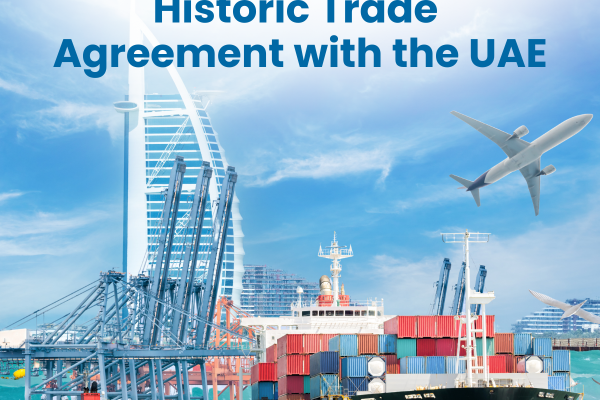Trading in the Middle East presents many challenges to Australian exporters and importers, particularly with regard to business formalities, customs and language, which can be greatly facilitated by engaging the services of an experienced agent like Colless Young.
The United Arab Emirates (UAE) forms part of our comprehensive freight forwarding network and we handle exports there by FCL and airfreight, plus also move LCL cargo in both directions on our services via Singapore.
The Australian Prime Minister has had a stopover in Abu Dhabi, where he met with the President of the UAE to discuss the historic commencement of the landmark Australia-UAE Comprehensive Economic Partnership Agreement, which comes into force 01 October.
The UAE is Australia’s largest trading partner in the Middle East, with total trade between us worth $12.3 billion in 2024. Our commercial profile there is significant, with UAE-based Australian companies numbering over 300. Many businesses use Dubai as a regional base, in view of its transport, financial and communications infrastructure.
Back in November 2024, the Australia-UAE Comprehensive Economic Partnership Agreement (CEPA) was signed—a bilateral free trade agreement that lays the groundwork for closer economic ties. Taking effect as from 01 October 2025, this deal will result in estimated tariff savings of $135 million in the first year, which is predicted to rise to $160 million per year once the agreement is fully implemented.
When that is reached, over 99% of Australian products will enter the UAE tariff free, including meat, dairy, grains and minerals. The agreement will also deliver cheaper prices at the checkout, with Australian households and businesses saving around $40 million a year. As an interesting side note, during PM Albanese’s visit to the UAE, he invited giant retail chain LuLu Hypermarket to set up in Australia in competition with our supermarket duopoly.
The UAE has ambitions to become a world-leader in Artificial Intelligence (AI). Abu Dhabi, which has the majority of oil and gas reserves in the UAE, has made significant investments in establishing aerospace, nuclear power, defence, information technology (micro-processing), petrochemical and clean-tech industries—the latter most prominently represented by the multibillion-dollar construction of Masdar City, a zero-carbon metropolis.
Bilateral relations between Australia and the UAE are friendly, multi-faceted and growing rapidly, as they are supported by extensive trade relations. The two countries enjoy good defence, aviation, security and law enforcement cooperation, the latter underpinned by agreements on mutual legal assistance in criminal law matters and extradition.
Australian companies and institutions are working in a range of industries, including: steel trading, construction and financial services, banking services, agricultural supplies and services, industrial minerals, dairy products, marine manufacturing, education and training services, sports and recreation, health services, livestock, oil field supplies, courier and freight services.
The UAE is situated in the southeast of the Arabian Peninsula, bordering Oman and Saudi Arabia. The President of the UAE and ruler of Abu Dhabi is His Highness Sheikh Mohammed bin Zayed Al Nahyan. The UAE is a member of the Gulf Cooperation Council (GCC), the Arab League, the Organization of Islamic Cooperation (OIC), the United Nations, the Organization of the Petroleum Exporting Countries (OPEC), the Non-Aligned Movement and the World Trade Organization (WTO).
Doing business in the Middle East demands attention to detail—avoid potential pitfalls by talking to Colless Young before you arrange your shipping formalities. Ask us how you can benefit from the new Australia-UAE Comprehensive Economic Partnership Agreement. Talk to Andrew, Tel: +61 7 3890 0800 email enq@collessyoung.com.au

